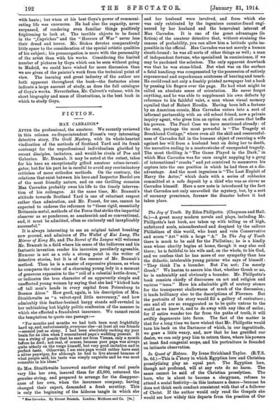In Quest of Hatasu. By Irene Strickland Taylor. (R.T.S, 2s.
6d.)—This is rstory in which Egyptian lore and Christian proselytising play an equal part. The Egyptian lore, though not profound, will at any rate do no harm. The same cannot be said of the Christian proselytism. The hero, who is about to become a clergyman, refuses to attend a social festivity—in this instance a dance—because he does not think such conduct consistent with that of a follower of Christ. If the author would only read the Gospels she would see how widely this departs from the practice of Oar Lord. The first scene of Christ's ministry, as described by the Beloved Disciple, is His appearance at a wedding feast, which was one of the most important social functions of the day.. All through His ministry there are descrip- tions of His dining at the houses of publicans and others, and we all know what was said of this practice by the Pharisees of that day. Not content with his own pharisaical attitude, the hero also tries to persuade his unfortunate little sister, who would have enjoyed going out as much as anybody, that it is not pleasant for a girl that men should touch her. Nothing but an extreme uncleanness of mind would appear to dictate this attitude. The story in itself is not a good one, but the saying of such things in the name of Christianity is calculated to do so great an amount of harm that we have thought it well in this instance to enter a protest.



























































 Previous page
Previous page